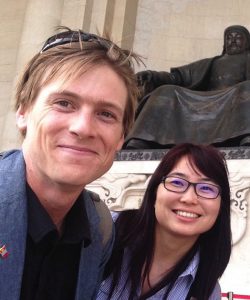Memo #337
By Christopher Carter – cj [at] cj-carter.com and Dulguun Davaanyam – d.dlgn [at] alumni.ubc.ca
 In the second part of this video, we examine how the EITI, and more specifically the EITI report, can and has had an impact reducing the negative social, cultural, and environmental impacts of mining by empowering civil society and stakeholders with the knowledge the EITI reports represents.
In the second part of this video, we examine how the EITI, and more specifically the EITI report, can and has had an impact reducing the negative social, cultural, and environmental impacts of mining by empowering civil society and stakeholders with the knowledge the EITI reports represents.
When EITI reporting was launched in Mongolia in 2006 mining companies and civil society had little knowledge of or interest in it. However, civil society was quick to recognize the value of the report, using it for instance to protect local people’s rights in the Petro China Dachin Tamsag case, suing the company and successfully securing payments for environmental reclamation. Today the mining sector in Mongolia receives high expectations from citizens interested to know how mining revenues will benefit them.
In its current state the EITI in Mongolia simply reports payments made and received between extractive companies and government bodies. The major question that remains is how the money is being spent in areas such as education, health and other core development needs of Mongolian communities. While sub-councils are emerging in mining regions, further reporting on how mining revenues are invested in social and community development will assist in making the lived effects and benefits of mineral development more transparent.
Further, the EITI report still presents a complex accounting spreadsheet of payments, reconciliation, donation and discrepancy reporting that does not easily present itself as approachable and useful to the everyday citizen. Here knowledge translation and communicative practice is critical in identifying what stakeholders in civil society desire from the report and mobilizing it into appropriate mediums.
The development of mineral resources can lead to one of two legacies, either one of corruption and failed governance or one of an empowered civil society and investment of revenues into comprehensive human development. The further successful adaptation and use of the EITI, led by civil society, may ensure the latter.
About the Authors:
Christopher Carter is a MASc candidate in Natural Resources Planning at the School of Community and Regional Planning at UBC. His research focuses on multi-stakeholder decision making, regional planning and natural resource policy.
Dulguun Davaanyam is a MASc candidate student at the NBK Mining Engineering department at UBC on the Oyu Tolgoi International Scholarship. Her current research focuses on mine tailings metagenomics and its application in mine remediation and environmental sustainability.
Thank you for the really interesting and worthwhile report. All the best for your future projects.